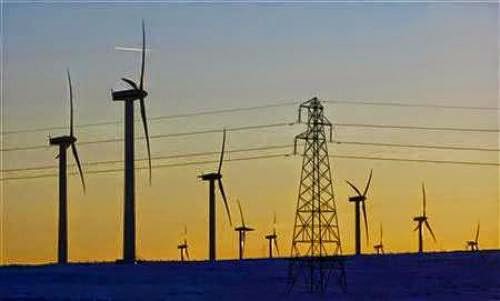
Photo credit. Reuters.
By Anders Lorenzen"
The National Grid, which runs the UK's electricity and gas supply has, according to the Times and BBC in a recent report released said that the UK could face a power crisis that could result in blackouts in the event of a cold snap this winter. The uncertainty is due to the so-called spare capacity, which last winter was at 5% but at this winter would drop to 4%, three years ago the margin was at 17%.
The shortage in spare capacity is due to several energy operators shutting down plants and generators, maintenance work, generators breaking down and new plants not coming online quick enough.
On top of that there is further evidence that due to rapid melting of Arctic ice, the UK could in the near future experience colder winters than the very mild winters in the last two years.
Some of the plants being closed down are ageing, inefficient coal power plants, and to meet the UK's climate targets cleaner alternatives are needed.
Wind power's role in keeping the lights onOne such thing is wind power, which has just set a series of new UK records. Throughout October 12% of electricity of the UK's electricity was met by spinning wind turbines while on the the 20th of October the number was as high as 24% throughout the day. But despite this, the UK government are leading a war against the cheapest source of clean energy: onshore wind.
The Communities Secretary Eric Pickles, who since June last year has been in charge of onshore wind farm applications, has interfered in 50 wind farm applications in just over a year. Those 50 wind power project would have added 520 megawatts (MW) capacity to the grid, enough to power 275,000 English homes and worth lb581 million to the economy, furthermore it would have created 2,186 jobs.
The trade body for the renewables industry RenewableUK are not amused, Chief Executive Maf Smith said that the 50 interventions in onshore wind projects goes against the public demand for renewables and that Mr Pickles decision-making policies are based on personal views rather what the public want and what is needed.
No blackoutsThe National Grid later said to the Guardian that there was little risk for power blackouts or emergency measures.
Though the UK government are investing in new energy, the vast amounts of new energy projects that the UK government are putting forward are long term projects such as the Hinkley nuclear power plant and extraction of shale gas. On top of that they are highly controversial projects with larger opposition than onshore wind power. The lifetime of nuclear power plant construction is around ten years and analysts are saying that even if extraction for shale gas was as successful as the government says, it would be 10-15 years before we would reap any benefit of it.
But the UK government is not entirely dismissive of wind power as long as it is large infrastructure projects and on the sea. Large investments are being made in big industrial offshore wind power projects, but these are also somewhat more long term projects than onshore wind power projects and are a lot more costly. From planning to construction the time span is at least 3-4 years. To build offshore wind more efficiently, to bring down cost and provide local jobs the right infrastructure will need to be in place and the first offshore wind factory will not be built in the UK before in 2016. Until then parts are being shipped from Denmark and Germany and so is a large part of the work force.
Conclusion:It is unlikely there will be power blackouts in the UK this winter, but the report from the National Grid outlines severe risk of a shortage of new energy capacity.
The government are playing a dangerous game in saying no to the cheapest form of renewable energy to replace aging and inefficient coal power plants. The only way to construct new coal power plants is to construct them with the Carbon Capture and Storage (CCS); a technology which is still unproven and highly costly.
There is no doubt that the UK still need a balanced energy system and would be reliant on fossil fuels for some time to come. But wind power is becoming more dominant in that balance and it's evident that wind power increasingly is playing to its strengths and can supply a baseload of secure and efficient energy.
But the National Grid themselves must also make investments, a more efficient grid and a grid more friendly to renewables is vital in a future energy system, where renewables will play an increasingly higher and more important role and moving further towards a smart grid system will reduce energy demand and will mean energy will be used more efficient.
The government should also realise the stress that the increasing demand is having on the grid and should champion decentralised energy to having a more efficient and stable grid.
Lastly by investing in energy efficiency you will cut demand and cut wasteful use of both electricity and heat.
"Sub edited by Charlotte Paton"
Related news:
As Scotland votes to remain part of the United Kingdom, investor confidence returns in the renewables sector
Tidal energy could save UK economy lb27 bn
Siemens to construct offshore wind turbine factory in the UK


















0 comments:
Post a Comment